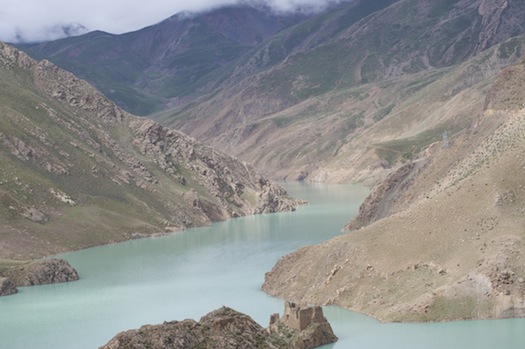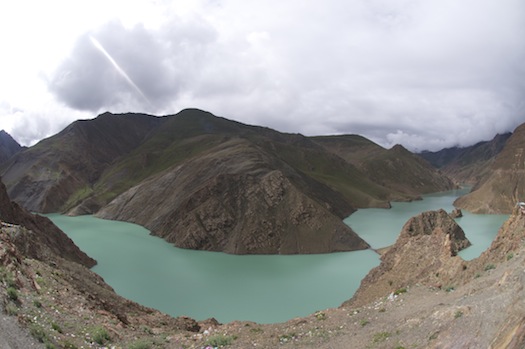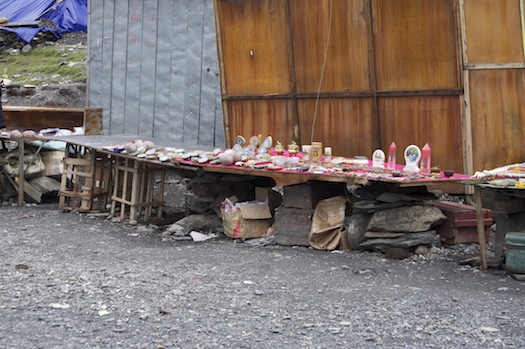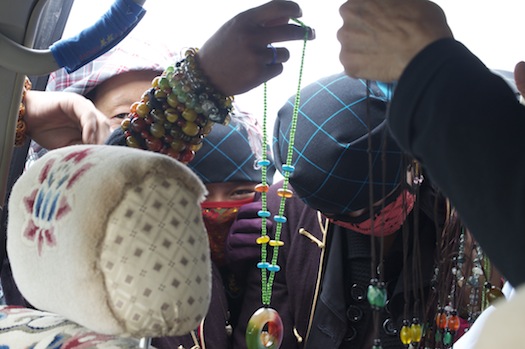Can You Sell Better Than the Saleswomen of the Tibetan Mountain Passes?

September 2, 2010
As you travel through Tibet, you will encounter thousands of people selling things, including Buddhist prayer bowls, prayer wheels, and prayer beads, carpets, art work and, of course, jewelry. I fully expected to see this in Lhasa, the capital of Tibet.
What I did not expect was to encounter some of the greatest salespeople I have ever witnessed selling on the mountain passes between Lhasa, Tibet and Mt. Everest.
At the top of the mountain passes (some as high as 16,800 ft. in altitude), there are stunning and breathtaking views that demand you leave your car to stand in awe of nature’s beauty and to take pictures. The views are some of the most beautiful you will ever see, and they are emotionally very powerful.
What better place and what better conditions to set up shop to sell souvenirs and trinkets?
Do I Have Your Attention?
As you pull over to the side of the road and begin to take pictures, the saleswomen of the Tibetan mountain passes set upon you immediately. They know that the first thing they need from you is your attention, and being a tourist, they know how to get it. They start by shouting: “Hello!”
Having encountered your kind before and knowing your motivation, they follow up with: “Just looking.” Apparently everyone who has ever walked in front of them has said, “just looking,” and they are now repeating it.
Finally, they attack you with “Cheap, cheap,” and “very good,” and “yak bone,” even when none of these things are true. They follow their scripts, and they have your attention.
The Puppy Dog Close and the Negotiation
If they don’t have your attention, they will press on with harder tactics, like stepping in front of you and putting jewelry in your hands. And Heaven help you if you dare to pick up or accept the piece of jewelry or whatever is handed to you. The saleswomen of the Tibetan mountain passes will not easily accept the jewelry back—they know that if you were looking at it, you almost certainly like it, and they are going to sell it to you.
Once it is in your hands, it is almost certainly yours.
This sounds like a hard tactic, but it isn’t. Even though they are wearing masks to protect their skin from the damage of the elements, you can see that their eyes are smiling.
Then they start the negotiation. You say: “How much?” They reply: “Cheap. Cheap.” Then, they pull out a tiny pocket calculator and type in the amount in Chinese yuan. They start with a number like 110 yuan (about $16), anchoring the negotiation on their side—knowing full well that you are going to reject their first offer. You say: “Too much!” Then, in a brilliant negotiating tactic, they hand you the calculator and say: “How much?” The saleswomen of the Tibetan mountain passes allow you to anchor the negotiation on the other side, knowing with an almost absolute certainty that your offer is going to be more than they were ever hoping to get.
The negotiation continues when you type the number 50 into their calculator and hand it back, upon which you will be greeted with a bright smile that is visible even through their masks. Your saleswomen will type in a new number that appears to have met you somewhere in the middle, but closer to the number you have used as an anchor. Now, she looks like she is completely reasonable, and the reasonable thing for you to do is accept her counteroffer of, say, 65 yuan.
I watched this occur over and over again. Those who thought themselves tough negotiators were cutting the original price offered by 50%. But those who knew better were negotiating prices that were as much as 80% or 90% lower by simply saying no and walking away. Well . . . trying to walk away. When their price was accepted, they walked away with bags and bags of jewelry and artifacts, pleased with themselves for being such shrewd negotiators.
What Makes Great Salespeople
What makes the saleswomen of the Tibetan mountain passes so successful is that they keep asking for the sale over and over again. As you try to walk away, the salesperson (and her calculator) follows you, shouting: “Last price! Last price!” When you stop and turn around, she will enter in a new number on the calculator and hand it back to you for your last price (which I assure you is not your last price unless she agrees to it, otherwise, she will grab your arm and continue hammering prices into her calculator).
They are determined, relentless, and they persevere.
They are fearless and they ask for what they want.
They ask for the sale, and they keep asking until they get someone to buy.
They have to sell because they have people who are counting on them. And so they sell.
They also know the value of additional services. The picture you are looking at cost me 50 yuan.
Conclusion
Great salespeople exhibit great sales behaviors. This is true no mater where you go in the world, including the remote Tibetan mountain passes. What can you learn from the saleswomen of the Tibetan mountain passes?
Questions
-
- The Tibetan saleswomen walk from their small villages every day, putting themselves in a position to sell their goods where their prospective clients will be. What are you doing to ensure that you are where your clients will be? Do you have a presence that ensures that you are there when opportunities arise?
-
- What do you do to ensure that you have your dream client’s attention? How do you ensure you know and understand their motivations for buying? What language choices do you make based upon what you know about your dream clients and their likely needs and motivations that ensure you capture their attention in a meaningful way?
-
- The Tibetan women follow you eyes and hand you the jewelry or whatever you were looking at; they are attuned to your buying signals. How do you assure that you are attuned to your dream client’s buying signals? What are the signals?
-
- Negotiating does not easily frustrate the Tibetan women. They are playful and bring a good spirit to their negotiations—even though each sale may mean more to them than to someone somewhere else. What do you have to do to make your negotiations less adversarial and less zero sum? How can you learn to enjoy the game?
-
- Who do you have to be to be as determined and relentless as you need to be to succeed?
-
- Who do you have to be to be as fearless in asking for what you need to make the deal work for you and for your dream client?
-
- Even though the saleswomen of the Tibetan mountain passes make transactional sales, there is much to be learned from them on asking for obtaining commitments. Who do you have to be to continually ask for the commitments you need to succeed?
- Who is counting on you to behave like a salesperson?














.jpg?width=768&height=994&name=salescall-planner-ebook-v3-1-cover%20(1).jpg)



Comments